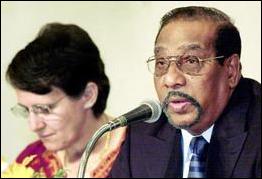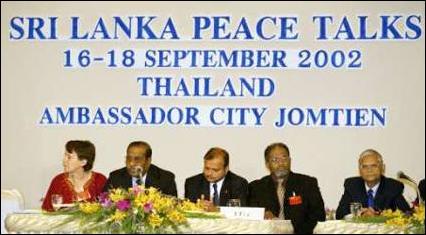
People's predicament first says LTTE
[TamilNet, Monday, 16 September 2002, 22:19 GMT]
(Feature) The first round of formal peace talks between the
Liberation Tigers of Thamil Eelam (LTTE) and the
Government of Sri Lanka (GOSL) began Monday in the
Sattahip Thai Naval base on a positive note though the
head of Colombo’s negotiating team laid down in his
opening speech non-negotiable elements which,
according to him, should be constant in “determining
the parameters of the negotiations." The Liberation
Tigers, however, desisted from any reference to
‘irreducible principles.’
Mr. Anton Balasingham, the chief negotiator of the
LTTE said: “The deepest aspiration of our people is
peace, a peace with justice and freedom; a permanent
peace in which our people enjoy their right to
self-determination and co-exist with others."
Despite efforts by Sinhala hardliners led by President
Chandrika Banadaranaike Kumaratunga to throw many a
spanner in the works, the LTTE and the GOSL moved
cautiously but inexorably towards finalising the
arrangements for the first round of talks this week.
 |
|
Chief Negotiator Anton Balasingham and his Australian-born wife, delegation secretary Adele Balasingham at the opening of peace talks, 16 September 2002. (Photo: REUTERS)
|
The Sinhala nationalist litany that Sri Lankan Premier
Ranil Wickremesinghe’s regime is conspiring to
permanently divide the island by handing over the
northeast to the LTTE on a platter has failed to
provoke the expected reaction from the Singhalese.
The general apathy of the Sinhala masses and their
apparent refusal to be provoked as on many bloody
occasions in the past is largely derived from the
belief that the Sri Lanka army is no match for the
LTTE militarily despite the extraordinary backing it
got from countries across the global political
spectrum, including the US, China and India, to
prosecute the war in the northeast.
The formal talks have been immensely bolstered by
direct discussions between senior officials of the
LTTE and the GOSL both in Colombo and in the Vanni.
President Chandrika and Sinhala hardliners have also
been pushing the line that the GOSL should take up
‘core issues’ such as devolution, territory,
demobilisation etc., and should reach an agreement on
human rights and the safety of the Muslims in the
east.
“The war may be over but the problem is still military
in nature. Decades of Sri Lanka army operations, the
unbridled application and abuse of the draconian
Prevention of Terrorism Act and the provisions of the
Emergency Regulations, the dense presence of the Sri
Lanka military in the northeast and the forced
eviction of thousands of Tamil families from their
homes have created immense social distortions which
have to be corrected first before we can meaningfully
approach fundamental political issues,” an LTTE
official said.
“We cannot put the cart before the horse,” according
to him.
Meanwhile the political weekly, Northeastern Herald,
quoting LTTE and Tamil National Alliance sources in
its latest issue this weekend said: “The Sri Lankan
government should come up with concrete proposals to
rehabilitate the agricultural and industrial sectors
of the northeastern province during the initial rounds
of talks in Thailand. The first and foremost
confidence building measure at this juncture is to
rehabilitate these key sectors of the Northeast’s
economy, ruined by more than 15 years of deliberate
neglect and military operations."
“Tamashas, exhibitions and regular visits by ministers
to the north are falsely being publicised as
confidence building measures. Our people cannot be
fooled by these. Real confidence building measures
should be in the form of monies actually released by
the treasury through the relevant ministries and
agencies for rehabilitating the dilapidated major
irrigation schemes in the northeast, such as the
Iranamadu Tank in Kilinochchi, the Giant’s Tank’s in
Mannar and the Valukkiyaaru Basin Scheme in Jaffna.
There should be concrete proposals with definite and
clear commitments to rehabilitate the Paranthan
Chemical Factory, the Kankesanthurai Cement Factory
and Valaichenai Paper Company," an LTTE official said.
Both Iranamadu and Giant’s Tank are in danger of
breaching their bunds during the coming monsoon, due
to 15 years of disrepair.
“But the Ministry for Irrigation and Water Management
is yet to release a cent despite several appeals by
local farmer’s bodies and officials," the Tamil
National Alliance MP for Vanni, Sivasakthi Anandan
said.
“The Ministry of Rehabilitation and Reconstruction is
shamming. If you look behind its flamboyant claims
about the north, you will find little or no monies
actually released for specific rehabilitation works,"
TNA sources said.
Six hundred million rupees are required to complete
works started by the Ministry of Rehabilitation and
Reconstruction in the northeast in 2001. The
government allocated 295 million for this but has so
far released only 160 million in funds which did not
include 93 million rupees the implementing agencies,
such as the district secretariats, still owe to
project contractors. Many works are stalled because of
the outstanding payments on rehabilitation and
reconstruction projects in the northeast.
The situation has been exacerbated by the fact that
the government has sharply undermined provincial level
rehabilitation and reconstruction in the northeast.
The Northeastern Provincial Ministry of Rehabilitation
and Reconstruction has been shorn of its powers to
work in the north; and in the east its priorities are
largely set by central government agencies such as the
Divisional Secretaries and the Road development
Authority.
The central Ministry for Eastern Province
Rehabilitation and Reconstruction allocated 77 million
rupees this year to the NEPC under a crash program.
The NEPC Ministry of Rehabilitation and Reconstruction
has completed works worth 44 million. But only 30.5
million has been released in actual monies by central
ministry, which is under SLMC leader Rauff Hakeem. The
77 million earmarked for the NEPC this year is much
less than last year’s allocation, officials said.
Tamil politicians have charged in the past that the
allocation of funds by Ministry for Eastern Province
Rehabilitation and Reconstruction has largely been in
favour of Muslim areas in the east.
Gajendrakumar Ponnambalam, TNA MP for Jaffna said:
“Nothing seems to have been done to rehabilitate and
reconstruct the north. The government allocated 1400
million rupees for the rehabilitation of the north.
This year it has been pruned down to just 400 million
rupees. This is one of the reasons why the TNA did not
vote on third reading of the budget. There was a one
billion cut in defence spending this year which could
have been put into rehabilitation and reconstruction
of the north. Even out of the four hundred million
allocated for this year we do not know how much is
being actually spent or on what it is being spent. We
do not see anything being done in the north. The
minister comes to Jaffna almost every week with his
entourage and promises to do this and that. But
government officials in Jaffna say that the ministry
is waiting for foreign funds to reconstruct the north.
It is during the time of ceasefire reconstruction can
be done best as a confidence building measure."
 |
|
Sri Lankan government chief negotiator G. L. Peiris (R) sits next to his Tamil Tiger adversaries (R-L), Jay Maheswaran (development expert), V. Rudrakumar (legal expert), Chief Negotiator Anton Balasingham and his Australian-born wife, delegation secretary Adela Balasingham at the opening of peace talks, 16 September 2002. (Photo: REUTERS)
|








